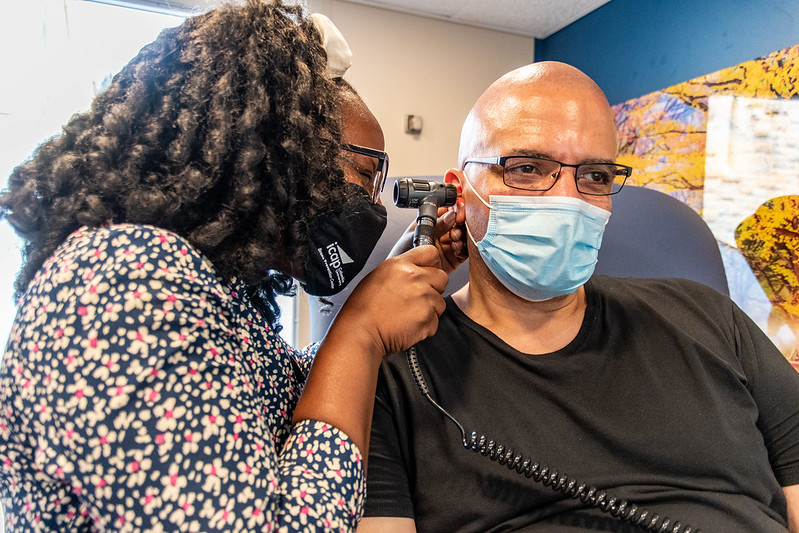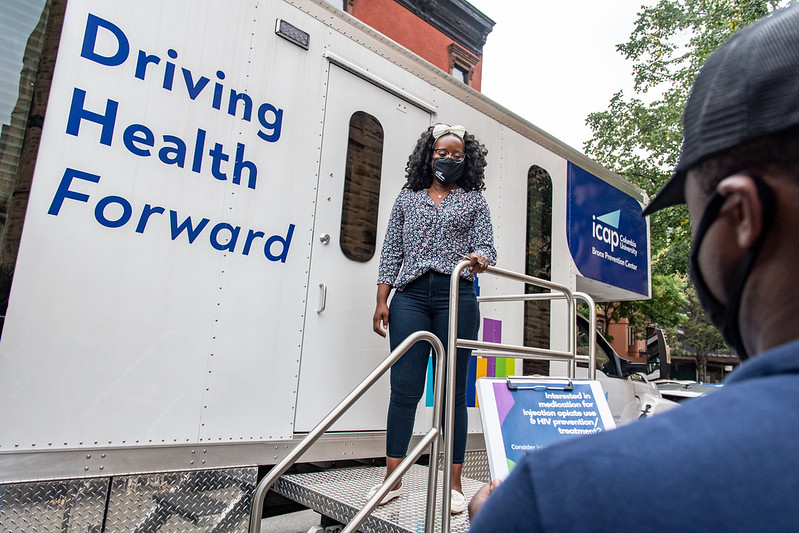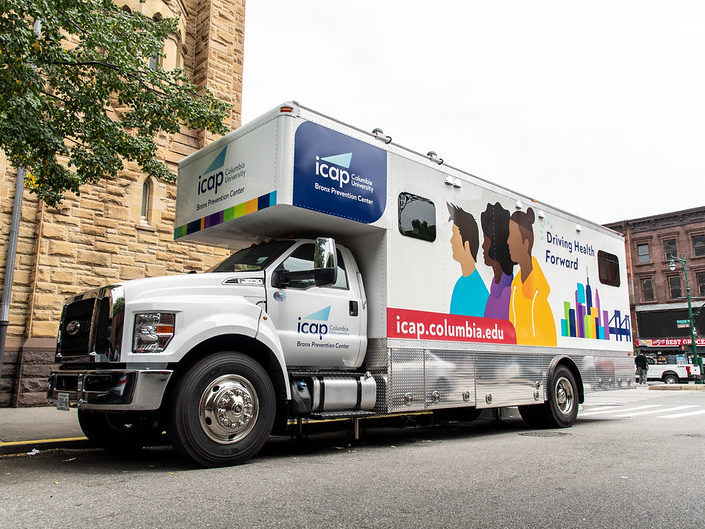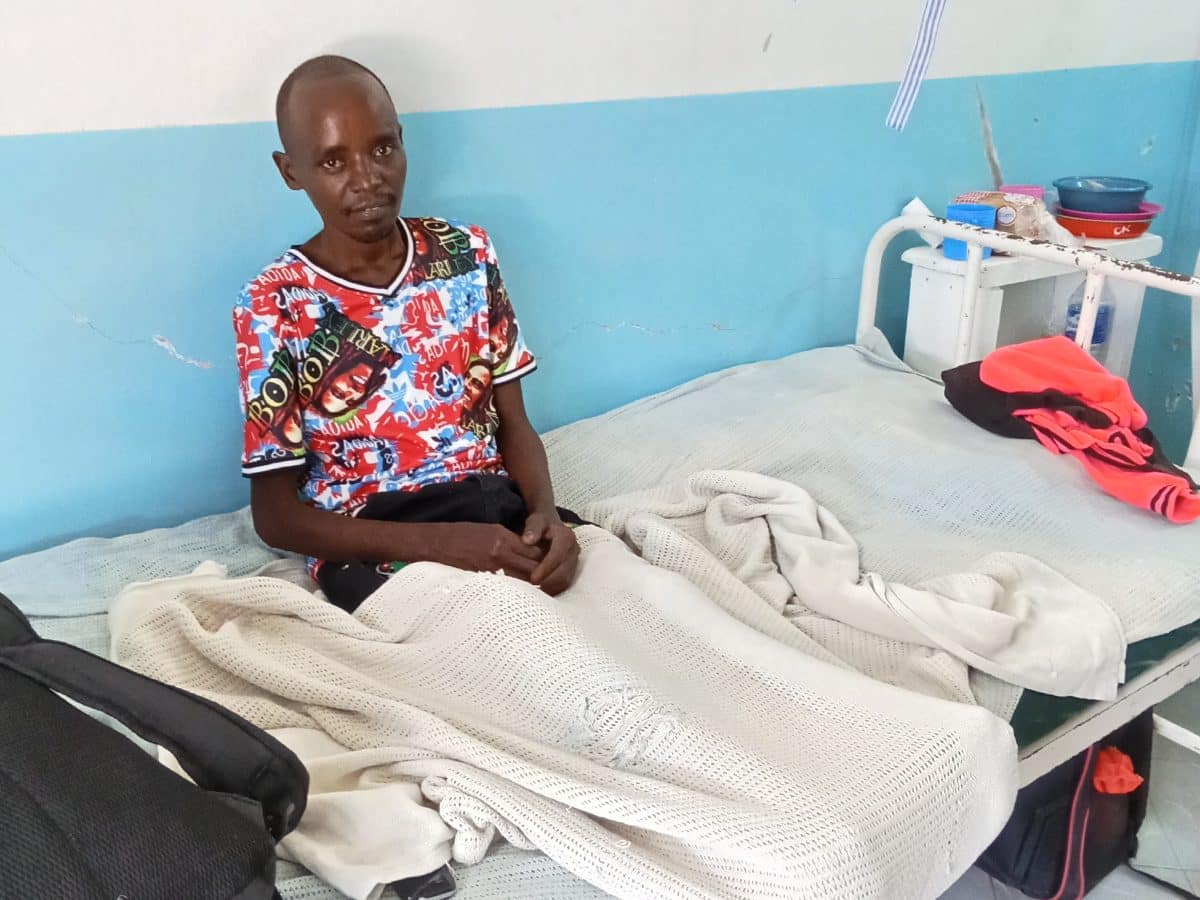In the streets of Harlem and the Bronx, a new “set of wheels” is getting noticed. All summer long, ICAP’s state-of-the-art mobile clinic has been making rounds in these bustling communities, drawing plenty of attention when it rolls up to spend the day in a busy neighborhood. With its bright graphics, it’s a head-turner for sure. But beneath the playful, colorful exterior is serious proposition – to address the intertwined public health crises of opioid addiction and HIV among people who inject drugs.
Drug overdose is the leading cause of accidental death in the United States, with more than 81,000 fatalities in the 12 months ending May 2020, the highest number of overdose deaths recorded in any 12-month period. The opioid overdose crisis remains one of the most widespread behavioral public health problems in the country. Factors such as lack of access to health care, poverty, mental health disorders, and use of multiple illicit substances combine to increase the risk of HIV transmission and acquisition and other health issues in people who inject drugs.
The mobile clinic is the vehicle for ICAP’s participation in the nationwide INTEGRA study (HPTN 094) that aims to determine whether using mobile health units to deliver integrated health services for people with opioid use disorder can improve HIV and substance use treatment and prevention. The study seeks to evaluate a strategy that brings integrated and judgment-free health services, supported by peer navigation, to locations that people who inject drugs can easily access.
The study is being conducted by the HIV Prevention Trials Network (HPTN) and is sponsored by the U.S. National Institute of Allergy and Infectious Diseases (NIAID) with funding from the U.S. National Institute on Drug Abuse (NIDA), both part of the U.S. National Institutes of Health (NIH). Study products for HIV treatment and prevention are provided by Gilead Sciences, Inc.
“This study is a jumpstart,” said Ellen Morrison, MD, site lead at the Bronx Prevention Center and Principal Investigator of the INTEGRA Study for ICAP. “We’re looking at whether driving this van into neighborhoods where opioid use is an issue and engaging people right on the street is a way to get them into care.”
Participants are randomized to receive integrated care on the van or to receive the services of a health care navigator who will assist the participant in finding care in the community. “The integrated care model means they will be able to receive their buprenorphine (a medication to treat opioid use disorder) prescription from the van. And they will also be tested for HIV, STIs, and hepatitis, and screened for routine primary care problems such as diabetes and blood pressure issues,” said Rashaunna Redd, NP, site clinician for ICAP’s Bronx Prevention Center. After six months, all participants transition to care in the community. Follow up in the study extends to twelve months.
“Those who are HIV negative but at risk can receive PrEP – a medication to prevent HIV infection. Anyone found to have HIV will be able to access treatment – routine antiretroviral treatment, antibiotics to prevent serious infections, whatever they need,” said Morrison. “Our goal is to make it as close to one stop as a possible. Although we recognize that some people will have serious medical problems that require that see specialists – and we will help them with that.”

“Meeting out-of-treatment people who inject drugs wherever they might be in their communities, providing them primary care services, and linking them to other needed care is likely to save lives,” said Wafaa El-Sadr, MD, MPH, MPA, HPTN principal investigator, global director of ICAP, and professor of epidemiology and medicine at Columbia University in New York.
As the unit proudly proclaims in bright lettering, ICAP is diving health forward. And this new unit, with the critical study it is carrying out in these key communities of New York City, is one of the engines adding miles to the reach of that mission.
For more information about HPTN 094, visit www.hptn.org/research/studies/hptn094, or ClinicalTrials.gov using study identifier NCT04804072.
About the HPTN
The HIV Prevention Trials Network (HPTN) is a worldwide collaborative clinical trials network that brings together investigators, ethicists, community members, and other partners to develop and test the safety and efficacy of interventions designed to prevent the acquisition and transmission of HIV. The U.S. National Institute of Allergy and Infectious Diseases, the U.S. National Institute of Mental Health, Office of The Director, the U.S. National Institute on Drug Abuse, and the Eunice Kennedy Shriver National Institute of Child Health and Human Development, all part of the U.S. National Institutes of Health, co-fund the HPTN. The HPTN has collaborated with more than 85 clinical research sites in 19 countries to evaluate new HIV prevention interventions and strategies in populations with a disproportionate HIV burden. The HPTN research agenda – more than 50 trials ongoing or completed with over 161,000 participants enrolled and evaluated – is focused primarily on discovering new HIV prevention tools and evaluating integrated strategies, including biomedical interventions combined with behavioral risk reduction interventions and structural interventions. For more information, visit hptn.org.
About ICAP
A major global health organization that has been improving public health in countries around the world for over 15 years, ICAP works to transform the health of populations through innovation, science, and global collaboration. Based at Columbia University in New York City, where it is part of the Mailman School of Public Health, ICAP has projects in more than 30 countries, working side-by-side with ministries of health and local partners to confront some of the world’s toughest health challenges. Through meaningful research, tailored technical assistance, effective training and education programs, and rigorous monitoring and evaluation of public health interventions, ICAP aims to realize a global vision of healthy people, empowered communities, and thriving societies. For more information about ICAP, visit: icap.columbia.edu.









